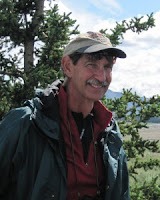The day before a frost hit our garden, August 19, our friend Frank Soos was killed in a one-person bike accident on a road in Maine. Frank spent summers on the east coast with his wife, Margo, returning each fall to Alaska and his beloved ski trails. We didn’t hear about Frank’s accident until the day of the frost.
Frank’s importance to me, as to so many others, was great. He taught undergraduate and graduate students at the University of Alaska Fairbanks from 1986 to 2004. During that time and all the time since, he’s worked tirelessly for writers all over Alaska and beyond. He’s a celebrated author of books of essays and stories (see bibliography below) He’s been a guiding force for the UA Press, 49Writers, Alaska Reads. He roamed the state as Alaska’s Writer Laureate for two years, encouraging writers of every age—“nagging,” he sometimes called it.
For such a public man, also a guy who had many friends and tended to them with an earnest regard, Frank was a shy person, too, a self-described “ruminant.” He liked to wander in otherwise uninhabited spaces: fishing streams, bike trails, winter hills. As he tells us in the opening of his autobiographical Unpleasantries—the essay “Another Kind of Loneliness” that he once read aloud to us at the Carriage House in Gakona—he quieted his mind in such places. From such quiet he drew his unanswerable and important questions about how to live fully in the world.
A mid-August frost is something you can expect around here. At 10 pm we saw the clear sky and realized what it could mean. We gathered our worn and holey tarp collection, using every scrap of it to cover peas and beets, carrots and potatoes. Because we did this, there will be a few more peas to graze on and the root vegetables will continue to fatten for a few more days or even weeks. When they are finally stopped by the cold and we dig them up to save them, the death of the garden will not be final but a pause, a kind of deep breathing beyond the span of a human life. It’s still sad, though, the end of a season: those unripened, unfinished peas.
Frank was a skinny, 6’5” seventy-year-old athlete with a sweet Virginia accent. If you were sharing your work with him, he might sit and listen with his face tilted, chin cupped in one of his hands, those impossibly long legs stretched out in front of him like #2 pencils. If it was a class or workshop, he’d wait for others to share their thoughts, then he’d ask a gentle question that would open a window for you on what you’d done, giving you a whole new batch of oxygen to take back into the work. You couldn’t wait to get back to work. He made you want to write; he made you want to help others want to write.
Losing Frank’s presence in my life was the sort of thing, well, the kind of thing that I would have told Frank about. That’s the hard spot death deals you.
Stumbling at night in a cold garden, holding off inevitable frost, failure means loss. Success means loss, too–coming right up. In Franks’s words, “Something will always be unsatisfactory, always a bit unresolved.” We are prone to wonder what the point is. As in art, a subject Frank knew well in the work of his artist wife Margo Klass, his artist friend Kes Woodward, his own art and woodwork and writing, he said that problems unsolved in one canvas can “suggest the questions that would be the starting impulse for the next.”
It’s what we do in spite of loss that might matter now—feel the cold while we cherish the food that will nourish us, let the forever unfinished garden go, imagine the next season.
* * * * *
Frank Soos’ work includes story collections Early Yet and Unified Field Theory (winner of the Flannery O’Connor Award for Short Fiction), Bamboo Fly Rod Suite: Reflections on Fishing and the Geography of Grace, and the 2016 Unpleasantries: Considerations of Difficult Questions.” With Margo Klass, he authored the box construction and prose collaboration, Double Moon. The essay you just read was originally published in Copper River Record.

